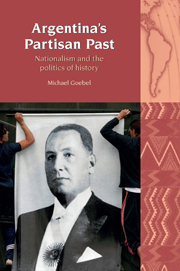Book contents
- Frontmatter
- Contents
- Acknowledgements
- List of acronyms and abbreviations
- Introduction
- 1 Argentina's two pantheons: from mitrismo to revisionism
- 2 Between co-optation and opposition: Peronism, nationalism and the politics of history, 1943–55
- 3 The deepening polarisation: the proscription of Peronism and its politics of history, 1955–66
- 4 The apogee of revisionism: nationalism, political violence and the politics of history, 1966–76
- 5 New narratives for a new era? Shifts, decline and resurgence of nationalist constructions of the past since 1976
- Conclusion
- Glossary
- Bibliography
- Index
Conclusion
- Frontmatter
- Contents
- Acknowledgements
- List of acronyms and abbreviations
- Introduction
- 1 Argentina's two pantheons: from mitrismo to revisionism
- 2 Between co-optation and opposition: Peronism, nationalism and the politics of history, 1943–55
- 3 The deepening polarisation: the proscription of Peronism and its politics of history, 1955–66
- 4 The apogee of revisionism: nationalism, political violence and the politics of history, 1966–76
- 5 New narratives for a new era? Shifts, decline and resurgence of nationalist constructions of the past since 1976
- Conclusion
- Glossary
- Bibliography
- Index
Summary
This conclusion seeks to find some answers to this study's principal questions: what do we mean when we speak of nationalism in twentieth-century Argentina; why has it continued to play a crucial role in the country's culture and politics; and what can we learn from this for the study of nationalism more generally? Based on the findings of the previous five chapters, three central arguments are proposed. The first is that, in global comparison, in Argentina the demarcations between those who were imagined to belong to the nation and those who were not (a feature common to all sorts of nationalism) were internalised to an extraordinary degree; that is, dividing lines tended to run through Argentina. The second argument is that the sort of biculturalism to which this internalisation of demarcation lines gave rise is better understood as an interpretive matrix about national identity than as a clear-cut divide between two political-cultural traditions (‘liberal’ versus ‘nationalist’). ‘Nationalism’ in the narrower sense of a political movement directed against the ‘liberal’ model of nation building has to be contextualised within a wider nationalism, understood as a discourse articulating political demands on the basis of an alleged national culture.
- Type
- Chapter
- Information
- Argentina's Partisan PastNationalism and the Politics of History, pp. 230 - 244Publisher: Liverpool University PressPrint publication year: 2011

